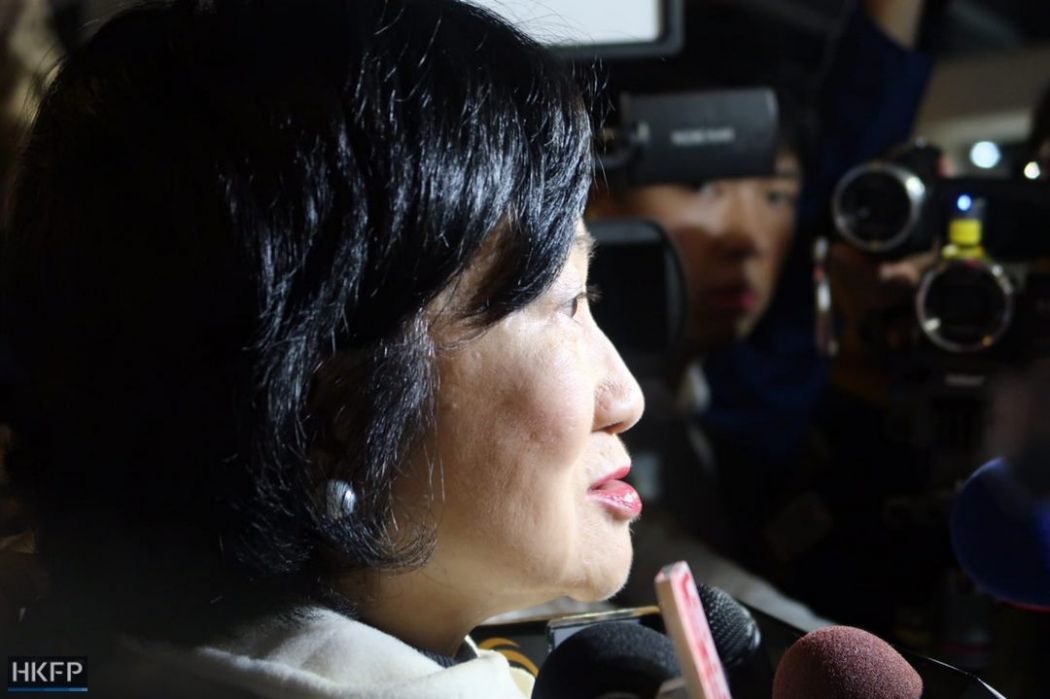Chief executive hopeful and lawmaker Regina Ip has revealed that she had been offered positions in Chinese governmental organs in exchange for her giving up her place in the city’s leadership race.
“[A middleman close to Beijing] said if you want to serve Hong Kong, you don’t have to be based in Hong Kong. You can work at the National People’s Congress or Chinese Political Consultative Conference. They said they can give me a high ranking post,” Ip said in an interview with i-Cable on Thursday.

She said the person was not a government official. “That was a smart move, because otherwise the suggestions would be considered official. But if you agree to the offer, very soon someone from the government will approach you.”
But Ip said she is not interested in any “consolation prize” and it would be “best if Beijing could leave her alone.” She said she would consider running for chief executive five years later, but it would depend on her health at the time.
“Look at [another candidate] Woo Kwok-hing. He’s in his 70s and looks healthy,” she said. Ip will be 72 in five years’ time.
‘Beijing-backed candidate’
Widely considered an underdog in the leadership race, Ip has been trying to garner support from the 1,200-member Election Committee. But the lawmaker said on Tuesday that she was not sure if she had secured more than 20 nominations.
Meanwhile, her rival Carrie Lam has reportedly secured more nominations than the minimum 150 required. Local media also reported rumours that China’s no. 3 official Zhang Dejiang recently met with pro-Beijing Election Committee members in Shenzhen to rally support for her.

Ip thinks that Beijing decided to throw support behind Lam because of the fierce competition.
“I think the central government feels insecure about the election because there are only 1,200 votes, and it is impossible to distribute them among the candidates. Since two tai-tais [married ladies] with similar support bases are competing with each other, it would be no good if each of us got only 400 votes,” she said.
To win the election, a candidate must receive more than 600 votes.
However, Ip warned that if Beijing gives the impression that it helped a candidate get elected, “it would not benefit the next administration in terms of governance.”
She added that Hong Kong people are very “sensitive” about Beijing’s interference in local elections, as it goes against its promise of a high degree of self-autonomy.

‘Always right’
Ip also commented on Lam’s tendency to “pick fights” with critics.
“Mrs Lam’s performance reminds me of myself from more than a decade ago. When you are used to being a government official, you tend to think that you’re right about everything,” she said. “We spent too much time in the government. You only hear one voice there.”
Ip headed the Immigration Department from 1996 to 1998, and the Security Bureau from 1998 to 2003, when she stepped down following mass demonstrations against the Article 23 security law that Ip put forward.
The lawmaker also criticised Lam for not taking responsibility for the mistakes her subordinates made. Lam previously told i-cable that she is not the supervisor of all nine bureau heads. She said each bureau head should be responsible for their policies.

In response, Ip said: “Of course the chief secretary is the supervisor of all bureau heads. If a supervisor does not have a sense of responsibility, it will greatly affect the morale of the subordinates.”
She gave the example of a controversy the Immigration Department was embroiled in under her leadership. “It had nothing to do with public policies or myself, but I was the one who apologised. I need to be responsible for the mistakes made by my subordinates. I didn’t blame them.”
No plan to join ExCo
Asked if she would consider joining the Executive Council – a top policy advisory body to the government – Ip said: “No. If Lam is so capable, she will be able to handle [the government] herself.”
She also dismissed the suggestion that she would become chief secretary if she lost the race. “I’m not capable of becoming chief secretary,” she said.
The nomination period for the small-circle chief executive race ends on March 1. The main contenders include Ip, Lam, ex-judge Woo Kwok-hing and former finance chief John Tsang. The election takes place on March 26.
